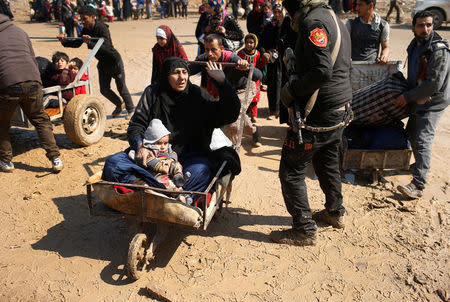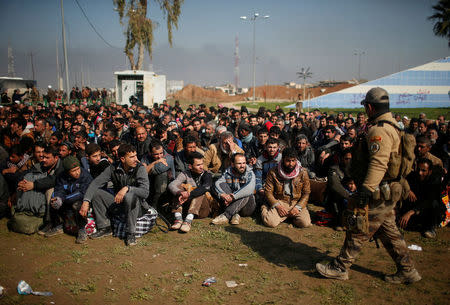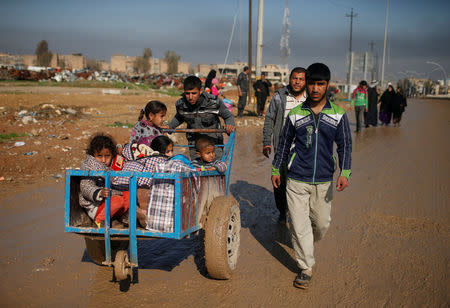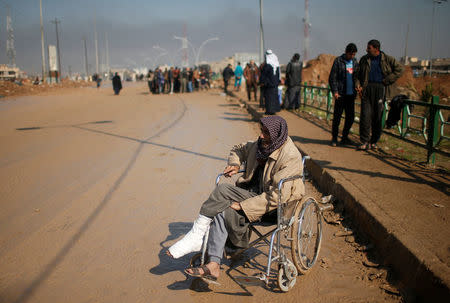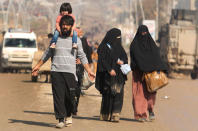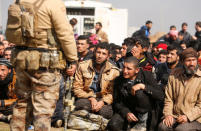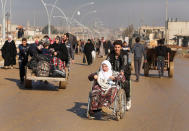IS gunmen target civilians fleeing Mosul by night
By Angus MacSwan MOSUL, Iraq (Reuters) - Islamic State gunmen are opening fire on men, women and children as they try to flee Mosul under cover of darkness, civilians who escaped the besieged Iraqi city said on Friday. Hungry and exhausted, thousands sloshed through the mud, past wrecked buildings and shattered pavements, to reach an army checkpoint. Some carried suitcases or bags, others had fled with just the clothes on their backs. They came by foot or piled into carts, and some pushed relatives in wheelchairs. A black-uniformed intelligence officer said about 6,000 people had come through on Thursday, the most he had seen at this exit, and a similar flow had poured in on Friday since about 4 a.m. Relieved to reach the safety of the checkpoint, some of those escaping described running a gauntlet of fire. "The snipers are professional, they do not care. Anybody that moves, they kill," said Faris Khader, from al-Abar district. The battle for Mosul, Islamic State's last major urban stronghold in Iraq, has now lasted more than five months. Government forces recaptured the east side in January and are besieging the militants on the western side of the Tigris river. At least 500,000 civilians are trapped inside, battered by government and U.S.-led air strikes and artillery, caught in the crossfire of ground fighting, or targeted by IS gunmen. The militants sometimes use residents as human shields. Khader blamed the government and international coalition for some of the death and mayhem. An IS sniper had been firing from the roof of his home when an air strike hit, he said. "There are many people dead under the rubble. Some in my family died. Nobody can take the bodies out. They were killed by an air strike." 'NO FOOD, NO WATER' Omar, a car mechanic, described life under IS. "It's very difficult. There's no food, no water. They are killing a lot of people. They kill anyone who goes out, they kill them in the street. "We have no money. We have suffered for three years," he said, clutching his young son to his shoulder. Salwan, 19, pushed his sister Noor, 21, who is paralysed and deaf, for more than two hours in her wheelchair to reach safety after their house was blown up. They were shot at during the trek, he said. Sweat poured from the face of Khaled Khalil as he trudged up the last stretch of the debris-strewn boulevard with his young son slung on his shoulder and his wife and three other children behind. He had no coat, no bag, and just a pair of plastic sandals on his mud-spattered feet. "I came like this. We had the chance so we fled," said the 36-year-old. "We have been travelling since yesterday. We are very tired but now we are safe." He was a carpenter but his shop had been destroyed. TAKING THE RISK Then an army jeep drove up with a wounded man on a stretcher. He was laid on the ground by an abandoned building. Bashar Hazem, 43, and Ali, 29, had carried out their brother Maan, 32, overnight. He was shot in the right thigh 20 days ago. He was bandaged up in the Jamhori hospital inside an IS-held area but left for home after three days because it was dangerous. He had no painkillers and grimaced as his brothers spoke. "We had no food. That's why we decided to risk escaping," Bashar said. They made a run with a big group in the early hours of Friday. But IS gunmen starting shooting at them and the group was split up. They saw three women shot in the legs. "Even if you are injured, they shoot at you. Our family is still inside but they are coming soon, God willing," Ali said. At the checkpoint, soldiers separated the women and children from the men. They waited, tired but visibly relieved, for buses to take them to a United Nations reception camp at Hamman al-Alil about 20 km (15 miles) away. The men were gathered in a park, sitting on the ground under guard by soldiers and awaiting questioning. "We do a first check here. Anyone we suspect of working with Daesh (IS), we pull to one side," the intelligence officer said. Some IS fighters had tried to leave disguised as women, their faces concealed by veils, he said, scrutinising arrivals. The men were then loaded onto trucks and taken to a centre for more thorough checks. An avuncular Sergeant Hussam Imad told jokes to a group of women and children waiting to be transported to the reception camp. They boarded the bus with smiles on their faces. (Reporting by Angus MacSwan; Editing by Mark Trevelyan)

 Yahoo News
Yahoo News 